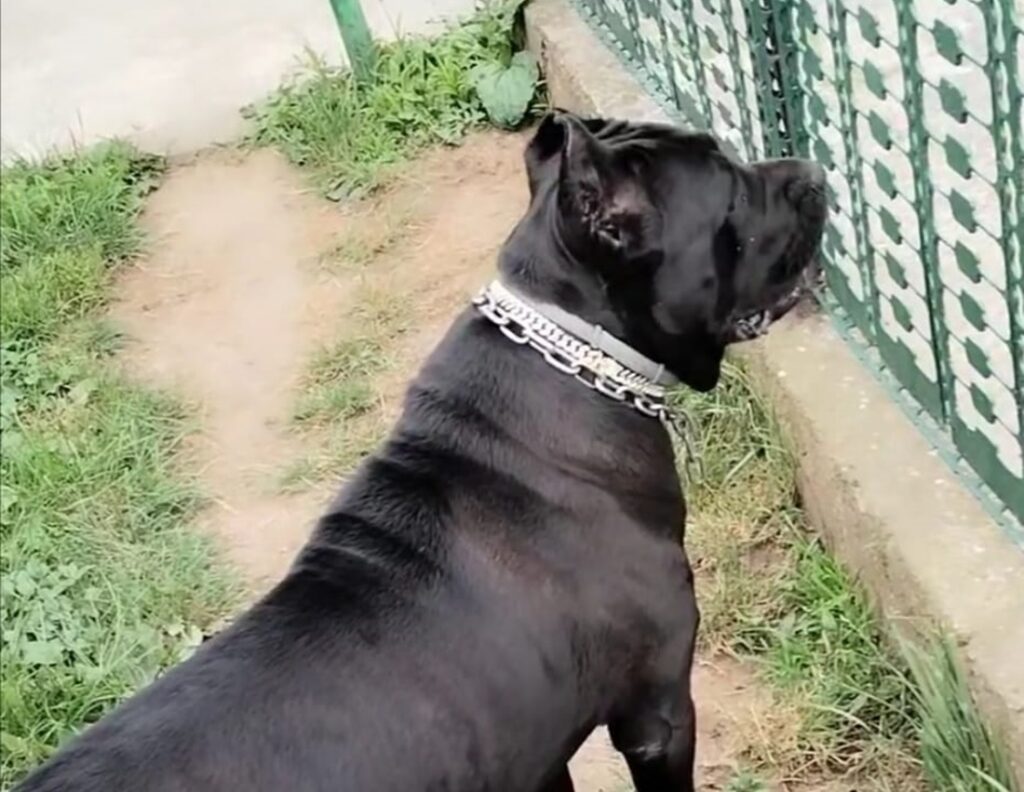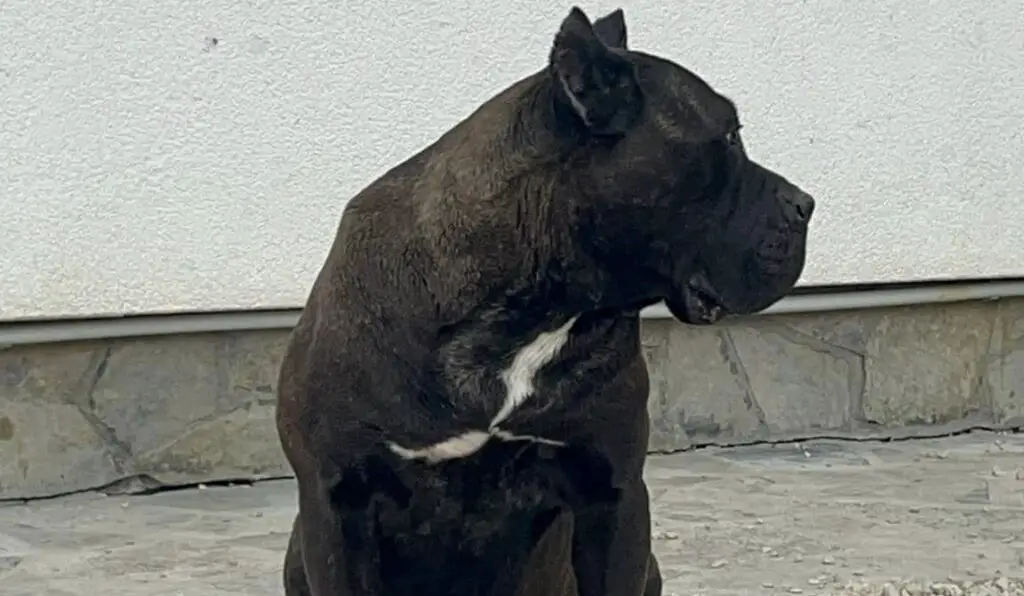Cane Corsos are large, muscular dogs known for their loyalty and protective instincts. These traits have led some people to wonder if Cane Corsos are dangerous.
While they can be imposing and powerful, it’s essential to understand that any dog’s temperament and behavior depend on several factors, including genetics, training, socialization, and the environment in which they are raised.
In this article, we will discuss the aspects that contribute to a Cane Corso’s behavior and outline the steps owners can take to ensure their Cane Corso grows up to be a well-behaved and reliable companion.
- Are Cane Corso Dangerous?
- Does the Cane Corso Have a Reputation for Being Aggressive?
- Has A Cane Corso Ever Attacked Its Owner?
- What Factors Affect a Cane Corso’s Aggression?
- How To Curb Aggression in Your Cane Corso?
- How Does a Cane Corso React to Strangers?
- How Dangerous Do Cane Corsos Become When Left Home Alone?
- FAQs
- Q: What makes Cane Corsos dangerous?
- Q: Are Cane Corsos banned in any countries?
- Q: Can a Cane Corso be a good family dog?
- Q: What is the temperament of a Cane Corso?
- Q: Are Cane Corsos an aggressive breed?
- Q: Can a Cane Corso be trained to be less aggressive?
- Q: How should I socialize my Cane Corso?
- Q: How much exercise do Cane Corsos need?
- Q: Is obedience training important for a Cane Corso?
- In Conclusion
Key Takeaway
- Cane Corsos can be potentially dangerous if not properly trained, socialized, and managed, due to their size, strength, and potential for aggressive behavior.
- The Cane Corso has a reputation for being aggressive, but this is often due to bad press and misconceptions rather than inherent aggression.
- There have been documented incidents of Cane Corsos attacking their owners, resulting in injuries and fatalities.
Are Cane Corso Dangerous?

No, Cane Corsos are not inherently dangerous. However, their behavior and temperament depend on proper training, socialization, and responsible ownership.
Cane Corsos can be imposing and powerful, but with proper training and socialization, they can be well-behaved and reliable companions.
Responsible ownership plays a significant role in ensuring that Cane Corso grows up to be a well-adjusted and safe family member.
It is essential to understand that every dog is an individual, and judging a breed solely based on stereotypes or misconceptions can be misleading.
With the right approach, a Cane Corso can become a loving and valued member of the family.
However, potential owners should be aware of the breed’s characteristics and be prepared to invest time and effort into proper training and socialization.
Does the Cane Corso Have a Reputation for Being Aggressive?

The Cane Corso is not known for being overly aggressive, but it does have a reputation for being protective and territorial.
The breed was originally bred as a guard dog, which has given them the nickname “the Italian Mastiff.”
They are alert and aware of their environment, and they take their job seriously. If they feel threatened or sense that something is wrong, they will act accordingly to protect themselves and their family.
This can be seen as aggression in some cases, but more often than not this behavior is just an indication of their natural instinct to protect their loved ones.
Has A Cane Corso Ever Attacked Its Owner?
Yes, there have been instances where a Cane Corso has attacked its owner or other family members.
However, it is important to note that such incidents are not specific to this breed alone and can occur with any dog breed.
Aggressive behavior in dogs often stems from factors like poor socialization, lack of training, abuse, neglect, or underlying medical issues.
A well-bred, well-socialized, and well-trained Cane Corso is typically a loyal, protective, and gentle companion.
It is essential for prospective dog owners to thoroughly research the breed, ensure responsible breeding practices, and invest time and effort in proper training and socialization to minimize the risk of aggression.
What Factors Affect a Cane Corso’s Aggression?
Factors that affect Cane Corso’s aggression include:
Genetics
Genetics plays a significant role in determining Cane Corso’s aggression levels. Some Cane Corsos may inherit genes that predispose them to aggressive behavior.
Responsible breeding practices are essential to ensure that dogs with aggressive tendencies are not bred.
Early Socialization
Proper socialization during Cane Corso’s early life is crucial in preventing aggression.
Exposure to various people, animals, and environments from a young age helps the dog develop appropriate social skills and reduces the likelihood of fear-based or territorial aggression.
Training and Obedience
A well-trained Cane Corso is less likely to exhibit aggressive behavior.
Consistent obedience training, positive reinforcement, and clear boundaries help the dog understand its place in the family hierarchy and reduce the chances of dominance-related aggression.
Physical Health
Health issues can contribute to Cane Corso’s aggression. Pain, discomfort, or illness can cause a dog to become irritable and more prone to aggressive behavior.
Regular veterinary check-ups and prompt attention to any health concerns are essential for maintaining a dog’s overall well-being.
Mental Stimulation
Cane Corsos are intelligent and energetic dogs that require mental stimulation to prevent boredom and frustration.
A lack of mental engagement can lead to destructive behavior and aggression. Providing puzzle toys, interactive games, and regular exercise can help keep a Cane Corso mentally stimulated and less likely to exhibit aggressive tendencies.
Environment and Living Conditions
A dog’s environment can significantly impact its behavior. Cane Corsos living in stressful or unstable conditions may be more prone to aggression.
Ensuring a safe, comfortable, and consistent living environment is crucial for keeping a Cane Corso calm and well-behaved.
Traumatic Experiences
Past traumatic experiences can also contribute to Cane Corso’s aggression. Dogs that have been abused, neglected, or experienced other distressing events may develop fear-based or defensive aggression.
In such cases, patience, understanding, and professional help from a canine behaviorist may be necessary to address the underlying issues.
How To Curb Aggression in Your Cane Corso?
Here is how to curb aggression in your Cane Corso:
Step 1: Early Socialization
Expose your Cane Corso to a variety of people, animals, and environments from a young age. This exposure helps them become more comfortable and confident in different situations, reducing the likelihood of aggression due to fear or anxiety.
Step 2: Consistent Training
Establish a consistent training routine with positive reinforcement techniques. Focus on teaching basic obedience commands and reinforcing good behavior. This consistency will help your Cane Corso understand their role in the household and minimize any confusion that could lead to aggressive behavior.
Step 3: Understand Your Dog’s Body Language
Learn to recognize the signs of stress, anxiety, or fear in your Cane Corso. By understanding their body language, you can intervene and redirect their behavior before it escalates into aggression.
Step 4: Create a Structured Environment
Provide a structured daily routine, including regular exercise, mental stimulation, and consistent mealtimes. A predictable environment will help your Cane Corso feel secure and reduce the chances of aggression due to frustration or boredom.
Step 5: Proper Exercise and Mental Stimulation
Ensure your Cane Corso receives adequate physical exercise and mental stimulation to prevent pent-up energy from turning into aggression. Engage in activities like daily walks, playtime, and puzzle toys to keep them both physically and mentally satisfied.
Step 6: Consult with a Professional
If your Cane Corso continues to exhibit aggressive behavior despite your efforts, consider consulting with a professional dog trainer or a veterinary behaviorist. They can help identify any underlying issues and provide tailored solutions to address your dog’s specific needs.
How Does a Cane Corso React to Strangers?
Generally, Cane Corsos are a bit reserved when meeting someone new. They may stare or bark as a warning sign that they don’t recognize the person.
However, with proper socialization and training, Cane Corsos can learn to be friendly toward strangers.
It’s important to introduce your Cane Corso to different people in a positive way from an early age.
This will help them understand that meeting strangers is not something to be afraid of and can even lead to rewards like treats or extra attention.
If your dog shows any signs of aggression towards strangers, it’s best to stop it immediately and work on teaching them better behavior.
How Dangerous Do Cane Corsos Become When Left Home Alone?
Cane Corsos can be very dangerous when left home alone, as they have a strong prey drive and can become aggressive if not properly trained.
They are large, powerful dogs that require regular exercise and socialization to prevent them from becoming bored or frustrated.
Without proper training and attention, a cane Corso’s natural instinct may lead them to bark excessively, dig holes in the yard, chew on furniture, or even act out aggressively towards people or other animals.
This behavior can be quite alarming and potentially dangerous.
FAQs
Q: What makes Cane Corsos dangerous?
A: Cane Corsos may exhibit aggressive behavior if they are not properly socialized or trained. Additionally, their large size and strength can make them potentially dangerous if they are not properly controlled by their owner.
Q: Are Cane Corsos banned in any country?
A: Cane Corsos are not currently banned in any country. However, some areas may have specific breed-specific legislation in place that could restrict ownership of Cane Corsos.
Q: Can a Cane Corso be a good family dog?
A: With proper socialization and training, a Cane Corso can make an excellent family pet. They are known for being loyal to their owners and can be very protective of their families.
Q: What is the temperament of a Cane Corso?
A: Cane Corsos are typically loyal and affectionate towards their owners. However, they can exhibit aggressive behavior towards other dogs or strangers if not properly socialized or trained.
Q: Are Cane Corsos an aggressive breed?
A: Cane Corsos have the potential to exhibit aggressive tendencies if they are not properly trained or socialized. However, with proper care, they can make excellent companions.
Q: Can a Cane Corso be trained to be less aggressive?
A: Yes, a Cane Corso can be trained to exhibit less aggressive behavior through obedience training and socialization.
Q: How should I socialize my Cane Corso?
A: Socialization for a Cane Corso should begin at a young age and should involve exposure to a variety of people, sights, and sounds. This can help prevent aggressive tendencies and make them more comfortable in different environments.
Q: How much exercise do Cane Corsos need?
A: Cane Corsos are a large and active breed of dog and require plenty of exercise. A daily walk or jog, plus playtime, is recommended to keep them healthy and happy.
Q: Is obedience training important for a Cane Corso?
A: Yes, obedience training is important for any breed of dog, including Cane Corsos. This can help them develop good behavior habits and prevent aggressive tendencies.
In Conclusion
In conclusion, it’s crucial not to judge a dog breed solely based on stereotypes or misconceptions.
While Cane Corsos are large and powerful, their behavior and temperament depend on various factors such as genetics, proper training, socialization, and responsible ownership.
By understanding these aspects and taking the necessary steps to raise a well-adjusted Cane Corso, owners can enjoy the companionship of this loyal and protective breed.
Remember that every dog is an individual, and with the right approach, a Cane Corso can become a loving and valued member of the family.





Leave a Reply